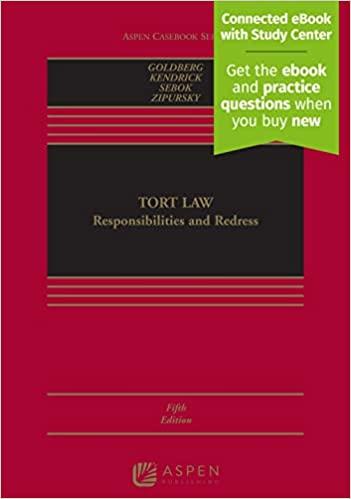Question
All the shareholder derivative lawsuits were settled, as eventually, Fantastically Innovative Surfing, Inc. was sold to a third buyer for $35 per share, and the
All the shareholder derivative lawsuits were settled, as eventually, Fantastically Innovative Surfing, Inc. was sold to a third buyer for $35 per share, and the shareholders unanimously agreed to the sale. After the sale, Paul, John, George, Chung, Denise, and Roberto went their separate ways.
Three years later, Denise approached Paul with the prospect of starting up a new company that would sell clothing apparel - focusing specifically on multi-colored shorts and socks - to skaters and surfers. She had taken up art in the years since the acquisition and had become a skilled graphic artist. She proposed that she would design all the apparel and Paul would manage the business, with Paul putting up all the financial capital for the business. Denise thinks that the business should be a closely held corporation, but she is not sure that is the best choice of business organization and would like Paul's advice.
Paul has come to you with the following questions. Your responses to each of the following questions should be approximately one to two paragraphs. You should substantiate your responses by providing any appropriate references to the cases and model statutes that we are studying in our course; no outside references are required. You may feel free to incorporate additional facts and assumptions into the hypothetical scenario, as long as you clearly note them.
- How do you think Paul and Denise should divide up the ownership shares of a closely held corporation - that is, what factors should each of them consider in deciding who owns what share of the corporation? If they do not choose to divide the shares evenly, what rights do you think the minority shareholder would have in this situation?
- Paul is also weighing whether the company should be a limited partnership or limited liability partnership. What factors should he consider in figuring out whether these would be appropriate entities for his and Denise's new business venture?
- Similarly, Paul is also considering that the company perhaps should be formed as a limited liability company? What factors should he consider here?
- Paul has recently learned about the for-profit benefit corporation and is intrigued by this possibility as well. What are the steps to forming a for-profit benefit corporation? What do you think would be the primary advantages and disadvantages of doing so?
- What internal documents can assist them to govern their internal operations and employee conduct?
- Which type of business organization do you think Denise and Paul should ultimately choose, and why? What are the key tax advantages and disadvantages from choosing that entity?
Step by Step Solution
There are 3 Steps involved in it
Step: 1

Get Instant Access to Expert-Tailored Solutions
See step-by-step solutions with expert insights and AI powered tools for academic success
Step: 2

Step: 3

Ace Your Homework with AI
Get the answers you need in no time with our AI-driven, step-by-step assistance
Get Started


